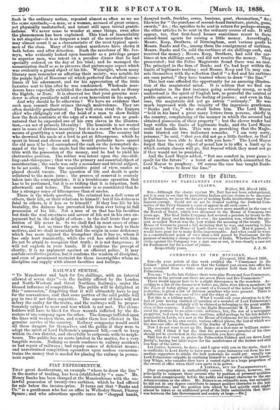COMMONERS IN THE MINISTRY.
Liverpool, 10th March 1858. Sta—In your article of this week entitled the " Commoner in the Cabinet " you endeavour to show that the Cabinet just sworn into office has been recruited from a wider and more popular field than that of Lord Palmerston.
You say, " In the late Cabinet there were nine Peers and four Commoners, whereas in the present one there are seven Peers and five Commoners." There would appear here to be a slight discrepancy in the numbers. Ac- cording to a list of the former now before me, there were fifteen members; in the Times of today giving an account of a Council of the latter having met yesterday, is given a list of thirteen members who were present. There is a difference in the one case of two and the other of one.
But this is a trifling matter. What I would call your attention to is the fact of your having omitted all mention of a member of Lord Palmerston's Cabinet, who most certainly will be claimed as belonging to the great middle class of this country. I allude to the Bight Honourable M. T. Baines. He owed his position to no aristocratic influence, but, the son of a newspaper proprietor, had risen by his own exertions, aided perhaps by his late father's popularity in Leeds, to a seat in the House of Commons for his native town, and has filled, to his own credit, various official places, the last of which was the sinecure office of Chancellor of the Duchy of Lancaster. Now I do not want to set up Mr. Baines as a first-rate or brilliant states- man, still I think it but due that the presence of a member of his class should not be overlooked in the enumeration you have given. Still less do I want to praise the Palmerston Cabinet and cry down Lord Derby's, having but little regret for the misfortunes of the former and still less hope of the latter.
Let justice, however, be done ; and I agree with you in the main, that it is creditable to Lord Derby to have gone in some instances out from his im- mediate supporters to obtain the best materials he could get: equally was Lord Palmerston culpable in confining himself to a narrow clique of heredi- tary Whip, who consider they have a vested- right to a large proportion of the sweets of office when their own party is in power. A LmEmu,, BUT NO PA.LMENSTON[AN. LOur correspondent is undoubtedly correct. Our object, however, was principally to compare those persons who by position or personal qualities come most conspicuously before the public and impart character to the one Administration or the other. Mr. Baines is an estimable man, but certainly ho did not in any degree contribute to impart positive character to the late Administration; and the position into which he had quietly sunk might almost be taken as an additional proof of the little assimilation that there was between the late Government and society at large.—ED.]


























 Previous page
Previous page